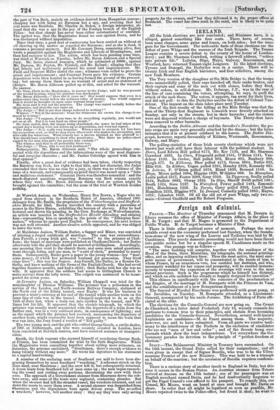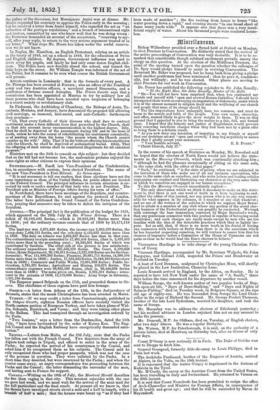,furrigu suit Catuniul.
FltANCE.—The Moniteur of Thursday announced that M. Drouyn de Lhuys resumes the office of Minister of Foreign Affairs, in the place of M. de Turgot ; and that M. Magne is promoted to the Department of Public Works. M. de Turgot becomes a Ministre d'Etat.
There is little other political news of moment. Perhaps the most notable event was the ceremony performed last Sunday, when the founda- tion-stone of the new wing of the Louvre and Tuileries was laid by M. Casablanca. This purely domestic proceeding would not have been forced into public notice but for a singular speech M. Casabianca made on the occasion. One passage was as follows-
" The same building will comprise, together with the residence of the Head of the State, three Ministries, the telegraphs, the national printing- office, and an imposing military force. Thus the most active, the most ener- getic means of government, will be concentrated in the hands of him to whom France, by an unanimous vote, has confided her destinies, and who, incessantly watchful for her repose and prosperity, will be enabled instanta- neously to transmit the expression of the sovereign will even to the most distant provinces. Such is the programme which he himself has dictated; and which an able architect has already so happily designed for execution."
This chimes in significantly with the rumours of proclamation of the Empire, of the marriage of M. Bonaparte with the Princess de Vasa, and the establishment of a new Bonapartean dynasty. The funeral of Marshal Excelmans was performed with great pomp, at the Invalides, on Tuesday. M. Bonaparte attended, as a Lieutenant- General, accompanied by his uncle Jerome. The Archbishop of Paris offi- ciated at the altar.
The elections for the Councils-General are now going on. The Count de Chambord, in a letter dated Frohsdorf, July 10, warmly counsels his partisans to remain true to their principles, and abstain from becoming candidates for the Councils-General. Nevertheless, several well-known Legitimists are candidates—M. de Panat among them. The majority, however, are said to have submitted. From all parts we receive testi- mony to the interference of the Prefects in the exclusion of candidates who are not "men of law and order" ; and of the threats hung over journals which show the least independence. Yet everywhere the Go- vernment parades its devotion to the principle of "perfect freedom of election."
Irerv.—The Baldasseroni Ministry in Tuscany have succumbed. On the 18th instant, the Grand Duke called for their resignations ; and all were given in except that of Signor Bocella, who was to be the Ultra- montane Premier of the new Ministry. This was held to be a triumph on behalf of the reaction ; but the accession of Bocella requires confirma- tion.
There is a curious story of another insult to England in Italy, but this time it occurs in the Roman States. An Austrian steamer from Trieste arrived at .Ancona on the 13th instant ; one of the passengers was an English merchant named Davis and he had inadvertently forgotten to get the Papal Consul's visa affixed to his passport. To remedy this, our Consul, Mr. Moore, went on board at once and brought Mr. Davie on shore. In order that all might be legalized as soon as possible, Mr. Moore repaired twice to the Police-office, but found it shut; he went to
the palace of the Governor, but Monsignore Amici was at dinner. Mr. Moore requested his secretary to apprize the Police early in the morning ; but he received a letter from Amici himself, who regarded the act as "an infraction of the pmtique regulations," and a breach of international right and custom, committed by one who ;mew well that he was doing wrong : the Governor demanded an account of the occurrence, "reserving to my- self, after your reply, to return to the very serious argument treated of in my letter." What steps Mr. Moore has taken under the awful reserva- tion we do not know.
In Naples' Mr. Hamilton, an English Protestant, relying on an article in the treaty of 1845, set up a school in 1848, for the education of Swiss and English/ children. By degrees, Government influence was used to drive away his pupils, and lately he had only some dozen English chil- dren. The Police have now forcibly closed the school, and turned the little boys on the street. Sir William Temple was informed of the act of the Police, but it remains to be seen what course the British Government will pursue.
Arrests continue in Lombardy : that is the formula of every post. A Dr. Passega has been arrested at Ferrara ; also an officer of the Pontifical army and two Austrian officers, a merchant named Simonetta, and a gentleman of fortune named Antogina. The 2'rieete Gazette says that a commission has been appointed at Mantua to try by military law all those persons who shall have been arrested upon suspicion of belonging to a secret society or revolutionary club.
In Piedmont, the Archbishop of Chambray, the Bishops of Aosta, Ta- rantasia, Atoriana, ankAnnecy, have denounced the proposed bill allowing civil marriage, as immoral, anti-social, and anti-Catholic : furthermore they proclaim- " 1st, That every Catholic of their dioceses who shall dare to contract matrimony under a form different from that prescribed by the Church, shall on that sole account incur -excommunication in the highest degree. 2Aly, That he shall be deprived of the sacraments during life and in the hour of death, unless he take the course of rehabilitating his matrimony canonically, or of sending away from his home the person whom the Church cannot consider as his wife.' 3dly, That if he die without effecting his reconciliation with the Church, he shall be deprived of ecclesiastical burial. 4thly, That the offspring of such unions shall be considered illegitimate for all canonical purposes." Ministers met on the 24th to consult on this subject : but they decided that as the bill had not become law, the malcontent prelates enjoyed the same rights as other citizens to express their opinions.
Swrrzentaxn.—M. Naeffi late Vice-President of the Confederation, has, in accordance with custom, been elected President. The name of the new Vice-President is Frei-Herose. La &three says—
"it is not necessary to tell our readers, that these elections have not the same importance as those of the United State; for public affairs are treated in the Federal Council. The principal influence in certain situations is ex- ercised by such or such a member of that body who is not President. The President acts as Minister of Foreign Affairs during his term of office." In Neufchatel, there have been meetings of the Royalists, and counter- meetings of the Republican; for and against the protocol of London. The latter have petitioned the Grand Council of the Swiss Confedera- tion, praying that measures may be taken to defeat the intrigues of the Royalists. •
AUSTRIA.—The principal fact is the publication of the budget for 1851, which appeared on the 20th July in the Wiener Zeitung. There is a deficit of 55,168,432 florins,—which is 28,955,581 florins more than in 1850; yet the ordinary revenue exceeds that of 1850 by 25,471,118 florins, The land-tax was 5,871,639 florins, the income-tax 2,362,579 florins, the stamp-duty 7,464,155 florins, and the salt-duty 6,423,625 florins more than in 1850. The duty on tobacco was 2,824,827 florins less than in that year. The extraordinary receipts amounted to 17,491,454 florins, (that is, 3,483,463 florins more than in the preceding year) ; 16,582,851 florins of which was contributed by Sardinia. The other side of the picture is less satisfactory. The ordinary expenditure was 257,558,370 florins. The Court, 6,109,818 florins; Home Department, 26,136,811 florins, (5,227,656 florins are for the Gen- darmerie); War, 111,999,292 dorms; Finances, 20,881,711 florins, (4,300,194 florins more than in 1850) ; Justice, 17,525,652 florins, (6,540,105 florins more than in 1850) • Commerce and Public Works, 12,891,903 florins ; Public In- struction, 3,781,871 florins; Agriculture and Mining, 316,675 florins. The extraordinary expenses were 20,862,100 florins, (that is, 20,448,038 florins more than in 1850.) The sums given are' Russia, 2,321,314 forms arma- ment in the autumn of 1850, 15,179,000 forms ; Army Corps in Germany, 3,361,786 florins.
The Emperor passed Belgrade on the 17th, and proceeded thence to Or- son. The chieftains of those regions have paid him homage.
GRXECE.—A letter from Athens of the 13th, in the inde'penclance of Brussels, states that the monk Christophoros has been arrested in Maine.
TURKEY.—If we may credit a letter from Constantinople, published in the Cologne Gazette, eighteen Russian officers have recently visited the North-eastern portion of European Turkey, and have taken plans of Wid- din, Schumla, Rustchuck, and Varna - and they were taking other plans hi the Balkan. This had transpired ihrough an investigation ordered by the Porte.
"Two Ionians," says a letter from the Dardanelles, dated the 11th July, "have been bastinadoed by the order of %alma Kan. The Eng- lish Consul and the English Embassy have energetically demanded satis- faction."
TareoLt.—Letters from Malta, of the 22d July, state that the Pacha has fallen out with the French Consul. Two deserters from the army of Algiers took refuge in Tripoli, and offered to enlist in the army of the Pacha; he reported the arrival of his countrymen to the Consul, and asked him if he recognized them as his subjects. The Consul said he only recognized those who had proper passports, which was not the case of the persons in question. They were enlisted by the Pacha. In a short time they deserted, but were recovered by the Pacha ; and when the courier came away, an angry correspondence was proceeding between the Pacha and the Consul; the latter demanding the surrender of the men, and having sent to France for support.
CA-NAB-I.—Writing on the 10th of July, the Montreal Herald describes the fire then raging in that city. This account coincides with the one we gave last week, and we must wait for the arrival of the next mail for the full particulars and the final result. At present all we know is, that the flames have enveloped streets about a mile and a half in length, with a breadth of half a mile ; that the houses were burnt up "as if they had
been made of matches " ; the fire rushing from house to house "like water pouring down a rapid," and crossing streets "in one broad sheet of flame many yards wide." It appears also that there was a very insuf- ficient supply of water. About ten thousand people were rendered home- less.



























 Previous page
Previous page